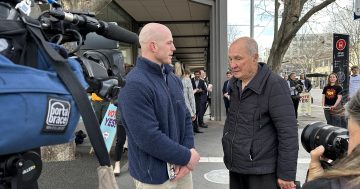
Independent ACT Senate candidate David Pocock says the ACT is being shortchanged. Photo: Michelle Kroll.
New analysis of Federal Government spending over the past five years shows the ACT is getting a raw deal and that Liberal Senator Zed Seselja is not delivering for Canberrans, according to Independent Senate candidate David Pocock.
Mr Pocock said it revealed a shocking disparity in the amount of Federal Government funding the ACT received when compared with other states and territories.
A review of federal budget documents showed the ACT receiving far less than its per capita share of specific purpose funding for affordable housing (1.14 per cent of the national total, about a third less) and community services (1.22 per cent of the total, about a quarter short), he said.
Mr Pocock said the ACT was being shortchanged the most in transport infrastructure, where the Federal Government has handed out $35 billion to the other states and territories for new transport infrastructure but only $146 million to the Territory, which equates to just under a quarter of its share by population.
He said that this equates to an outlay of $1387 per head on average in the rest of Australia to build or maintain transport infrastructure but only $335 for every Canberran – $1050 less than people in other states and territories.
“It is outrageous that over the past five years Canberrans have received only $1 for every $240 paid to the states and territories for transport infrastructure,” Mr Pocock said.
“The Federal Government has been taking the entire ACT community for granted by shortchanging us in this way.
“There have been all sorts of allegations made about independents not having the capacity to deliver in the same way a minister could, but this analysis shows how very poorly our community is being served by its current government representative.”

Budget figures supplied by Pocock team. Image: Supplied.
Mr Pocock said the Federal Government had also failed to deliver on its commitments.
He said that in the last two years the Federal Government promised $145 million of grants for transport projects but only delivered $116 million, a 20 per cent shortfall.
Looking ahead, the ACT’s share of federal infrastructure grants from 2021-26 was forecast to rise marginally from 0.4 per cent to 0.7 per cent, still well short of its 1.7 per cent of the population.
“There has been a marginal increase, but we are still well short of getting what we deserve on a per capita basis,” Mr Pocock said.
“Why should the per capita infrastructure spend on someone in Tasmania ($4670) be more than three times higher than someone in the ACT ($1383)?
“It’s time we stopped being taken for granted and started getting our fair share. The people of the ACT deserve better than this.”
Mr Pocock said the ACT was not forecast to receive any funding at all from the Federal Government’s planned $4.5 billion spend on Roads of Strategic Importance and a mere $200,000 from the $3.45 billion budgeted nationally to tackle urban congestion.
“I know from speaking to the community over months that restoring integrity, accountability and transparency in politics is a priority,” he said.
“Being so thoroughly dudded when it comes to infrastructure and other spending just adds to the weight of evidence in support of the reforms I have been calling for.”
While the ACT’s infrastructure needs as a geographically smaller, more compact jurisdiction may be less than those of other states like Tasmania, Mr Pocock said it does not justify allocating the ACT only a quarter of our per capita share of transport spending, especially considering the ACT’s fast-growing population.
“It is no coincidence that cities which are the most marginal electorally also have the highest spends. This is clearly borne out in the analysis which shows a sharp increase in the number of untied grants,” Mr Pocock said.
In the 2021-22 financial year, the Commonwealth has budgeted on paying the states $76.5 billion in tied grants, but $91 billion in untied grants. In previous years the split was roughly 50/50 between tied and untied grants.




















